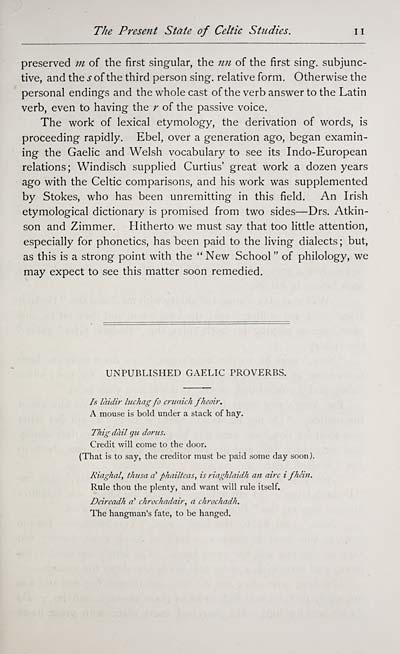Blair Collection > Celtic magazine > Volume 12
(21)
Download files
Complete book:
Individual page:
Thumbnail gallery: Grid view | List view

The Present State of Celtic Studies.
preserved vi of the first singular, the nn of the first sing, subjunc-
tive, and the s of the third person sing, relative form. Otherwise the
personal endings and the whole cast of the verb answer to the Latin
verb, even to having the ;' of the passive voice.
The work of lexical etymology, the derivation of words, is
proceeding rapidly. Ebel, over a generation ago, began examin-
ing the Gaelic and Welsh vocabulary to see its Indo-European
relations; Windisch supplied Curtius' great work a dozen years
ago with the Celtic comparisons, and his work was supplemented
by Stokes, who has been unremitting in this field. An Irish
etymological dictionary is promised from two sides — Drs. Atkin-
son and Zimmer. Hitherto we must say that too little attention,
especially for phonetics, has been paid to the living dialects; but,
as this is a strong point with the " New School " of philology, we
may expect to see this matter soon remedied.
UNPUBLISHED GAELIC PROVERBS.
Is laidir bichag fo cruakh fhcoir.
A mouse is bold under a stack of hay.
Thig dail gii dorus.
Credit will come to the door.
(That is to say, the creditor must be paid some day soon).
Riaghal, thiisa a' phailtcas, is riaghlaidh an aire i fhein.
Rule thou the plenty, and want will rule itself.
Deireadh a' chrochadair, a chrochadh.
The hangman's fate, to be hanged.
preserved vi of the first singular, the nn of the first sing, subjunc-
tive, and the s of the third person sing, relative form. Otherwise the
personal endings and the whole cast of the verb answer to the Latin
verb, even to having the ;' of the passive voice.
The work of lexical etymology, the derivation of words, is
proceeding rapidly. Ebel, over a generation ago, began examin-
ing the Gaelic and Welsh vocabulary to see its Indo-European
relations; Windisch supplied Curtius' great work a dozen years
ago with the Celtic comparisons, and his work was supplemented
by Stokes, who has been unremitting in this field. An Irish
etymological dictionary is promised from two sides — Drs. Atkin-
son and Zimmer. Hitherto we must say that too little attention,
especially for phonetics, has been paid to the living dialects; but,
as this is a strong point with the " New School " of philology, we
may expect to see this matter soon remedied.
UNPUBLISHED GAELIC PROVERBS.
Is laidir bichag fo cruakh fhcoir.
A mouse is bold under a stack of hay.
Thig dail gii dorus.
Credit will come to the door.
(That is to say, the creditor must be paid some day soon).
Riaghal, thiisa a' phailtcas, is riaghlaidh an aire i fhein.
Rule thou the plenty, and want will rule itself.
Deireadh a' chrochadair, a chrochadh.
The hangman's fate, to be hanged.
Set display mode to: Large image | Transcription
Images and transcriptions on this page, including medium image downloads, may be used under the Creative Commons Attribution 4.0 International Licence unless otherwise stated. ![]()
| Early Gaelic Book Collections > Blair Collection > Celtic magazine > Volume 12 > (21) |
|---|
| Permanent URL | https://digital.nls.uk/76461261 |
|---|
| Description | Volume XII, 1887. |
|---|---|
| Shelfmark | Blair.13 |
| Attribution and copyright: |
|
| Description | A selection of books from a collection of more than 500 titles, mostly on religious and literary topics. Also includes some material dealing with other Celtic languages and societies. Collection created towards the end of the 19th century by Lady Evelyn Stewart Murray. |
|---|
| Description | Selected items from five 'Special and Named Printed Collections'. Includes books in Gaelic and other Celtic languages, works about the Gaels, their languages, literature, culture and history. |
|---|

